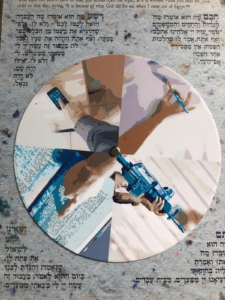Dear Congregation Beth Israel members and friends,
“Why is this night different from all other nights?” That’s the question that launches us into seder. Many Pesach customs are designed to prompt questions. We ask why, and we plumb our traditions for answers, and meaning, and the nourishment our souls most need.
This Pesach will be different because it comes after six months of war between Israel and Hamas. The attacks of October 7 shattered a sense of safety many of us hadn’t been aware we had until it was gone. The ensuing war has shattered many of us in other ways, our hearts broken by loss and grief and humanitarian crisis. And our different views of the war have frayed some of our relationships. In that sense, Pesach comes at the right time. This is exactly when we need to gather for food and ritual, story and song, to ground us in who we aspire to be.
The story of the Exodus is the story of departing from the confines of physical enslavement and kotzer ruah (a constricted and crushed spirit). What does it mean to say that we were in a tight place and God brought us forth, when we know that the feeling of being in “a tight spot” this year is likely to continue long after we return to eating leaven? What does it mean to proclaim our freedom while others are suffering? What does it mean to stand for liberation even as we grapple with our own responsibility for what is broken in our world?
The seder was made for these questions, and I can’t wait to delve into them with y’all.
Some of our sages’ ancient answers may speak directly to who and where we are. Others might invite some re-envisioning. Like the text about the Four Children (traditionally Four Sons): one wise, one wicked, one simple, and one who doesn’t know enough to ask.
You might remember this from seders past. The wise one asks to learn all the laws of Pesach, and gets to learn the story of the Exodus to his heart’s content. The wicked one sneers, “what does all this mean to you?” By saying “to you,” instead of “to us,” he has removed himself from the community, and the tradition responds to that harshly. (The classical response is, “I do this because of what God did for me when God redeemed me from slavery; for me, not for you, since you’ve chosen not to be part of us, and therefore if you’d been there back then, God wouldn’t have bothered to redeem you.” Ouch.)
The simple one asks a simple query and gets a simple answer. And the one who is too young to know what to ask: that one must be taught, and we gently begin to teach them the story of who we are.
Many teachers and scholars have noted that these four children could all be facets of one human being. We all have moments of being each of these. Others note that these archetypes could represent different kinds of learners (physical, emotional, thoughtful, spiritual).

This year I’m also sitting with the notion that titles like “wise” and “wicked” and “simple” depend on one’s vantage.
I have a beautiful haggadah called Unbound: the Recreated Haggadah. It’s a piece of multimedia art printed on large pieces of very heavy cardstock, and the ribbon holding it together can be removed, so each lovingly-detailed page can be handed to someone at the table. On the page with the Four Sons, there is a spinning wheel attached, like a board game spinner. It’s divided into four quadrants: a hand holding a machine gun, a hand pointing at Torah text in a book, a hand touching a smartphone, and a hand with a paintbrush. Spin the wheel: which one here is “wise,” and which is “wicked”? In what context, for what purpose, serving whose needs?
This year I’m struck by the only real detail we get about the so-called “wicked” child: they position themself as being outside. “What does all this mean to you” – the very framing of the question presumes that the questioner isn’t part of “us” anymore.
Hillel teaches (Pirkei Avot 2:5), “Do not separate yourself from the community.” Community needs all of us. That’s always been true. And there’s no better time to be in community than seder.
Join us for seder as we read ancient texts through the lenses of today, pray some new prayers written just for this year and its challenges, and enter together into our people’s timeless wrestle with the obligations of freedom. Please RSVP by April 8 so Jen Burt and her family can cook enough food, and if the cost gives you pause, let me know.
Wishing all of us meaning during this season of our liberation,
— Rabbi Rachel





